Susan Orlean's Blog, page 12
December 8, 2010
Facts of Life
When my son was born, and after a day of lying-in I was told that I could leave the hospital and take him home, I burst into tears. It wasn't the emotion of the moment: it was shock and horror. Who in their right mind would allow me—ignorant of all childcare matters, an indifferent babysitter in my teen-age years, a youngest child who had never changed a diaper—to take full possession of this creature? Never in my life have I ever been presented with a job for which I was so poorly prepared. If, say, at age thirteen I had been told to drive a car, I would have at least seen cars driven in movies and probably had played on a simulator at some game arcade. A baby? I knew nothing about babies at all.
I never thought I'd ever be as dumbfounded by a life task as I was by parenting, but once again I am. My mother is eighty-seven—a widow, in fairly good physical health, but mentally deteriorating. This all came as a shock to me, the idea that my parent would start needing me rather than the other way around, and there is nothing that I can draw on to make me feel like I know what I'm doing. Just as I did when my son was born, I'm scrambling: I'm buying books about dealing with elderly parents, signing up for e-newsletters, doing research. It's interesting but finally useless. There is nothing new about my situation, just as there was nothing new about having a baby, but that doesn't help. The fact that I am not the first person to have a parent forget the day of the week or get lost driving home doesn't make it less upsetting, and doesn't help me know what to do. My son, who is now in kindergarten, has a class at school called "Life Skills" on Thursday afternoons. Was that the class I forgot to take? Would there have been, in the curriculum, something to explain what to do and how to feel if you live far from your parents and have a demanding job and life, but they need you? I grew up near my grandparents, and when they started to fray and fade, my parents took care of them—visiting them daily, grocery shopping for them, managing what they needed. That would have been my real-life Life Skills class, except it's the wrong edition: I live four hundred miles from my mom and work more than full-time, so the proximity and flexibility that made that kind of care-taking possible for my parents and their parents isn't an option for me.
Sometimes I'm dazzled by how modern and fabulous we are, and how easy everything can be for us; that's the gilded glow of technology, and I marvel at it all the time. And then my mom will call, and in the course of the conversation she'll say something disjointed that disturbs me and reminds me of her frailty, and then she'll mention that it's snowing hard in Ohio and I'll wonder how she's going to get to the grocery store, and I look at my gadgets and gizmos, and I realize none of them will help me. If anything, they've filled me with the unreal idea that everything is possible; that virtual is actual; that you can delete things you don't like; that you can find and have whatever it is you want whenever you want it; but instead I'm learning that the truest, immutable facts of life are a lot harder and slower and sometimes sadder, and always mystifying.
December 6, 2010
Vapor
When I wonder what the future of books will be, I often think about horses. Before automobiles existed, everyone had a horse. Then cars became available, and their convenience, compared to horses, was undeniable. They could go faster, farther, and even though they required maintenance they didn't need space in order to thrive. Horses lost out to cars, but obviously they didn't die out as a species. They became niche animals, valued for their beauty and elegance. They were gift items (the Christmas pony!); they were specialized and anti-utilitarian transportation (the hayride, the Central Park carriage); they were a hobby, enjoyed by people with lots of space and teen-age girls who had roped their mothers into driving them out to country stables.
Writing isn't going away anytime soon, I'm sure, but I do wonder if physical books will eventually gallop down the same path that horses did. Today's launch of Google's eBookstore makes that seem less eventual and maybe something that will happen any day. I can imagine a future in which real books will exist but in a more limited, particular way. They will be given as gifts; books that are especially pretty or visual will be bought as hard copies; books that are collectible will continue to be collected; people with lots of bookshelves will keep stocking them; and anyone who likes to make notes in books will keep buying books with margins to fill. Otherwise, most of us will read most of what we read electronically.
The other day, I decided I wanted to read "Room," by Emma Donoghue. I ordered an electronic version of it, and read the first chapter on my phone. Then, in a moment of delirium completely unrelated to the topic at hand, I decided to clean my desk, and discovered that I actually had a copy of "Room"—a real paper-and-ink copy—that someone had sent me a few months earlier. What to do? I'd never before owned a real copy and an electronic copy of the same book, and I was curious to see which one I'd choose. The real book looked so big—I think the reason I hadn't started reading it when I received it was that I didn't think I had the time for such a fat book. The ebook, though, was a vapor: it was something that had no size at all and just unspooled as I flicked from page to page; I'm not sure I even noted how many pages it had when I downloaded it. The real book had a cover I didn't really like; the ebook looked like my iPhone, so I had no opinion about it, pro or con. The real book required real estate, while I was reading it and while I wasn't. It would be stacked beside my bed while I was working my way through it, and then would have to find space for it on my already sagging bookshelves. I would be proud to have visitors notice that I had read the book ("gripping, claustrophobic, and fantastically evocative"—Washington Post) but I didn't really have space for it. I also liked the idea that I could read a sentence or two while sitting in a doctor's office or even at a red light, just by calling it up on my phone. I've been too busy to read since I found myself with both versions, but I'm curious to see what I'll do.
November 30, 2010
Bootless
I wish I had coined the phrase "tyranny of choice," but someone beat me to it. The counterintuitive truth is that have an abundance of options does not make you feel privileged and indulged; too many options make you feel like all of them are wrong, and that you are wrong if you choose any of them. Unlimited choice is paralyzing. The Internet has made this form of paralysis due to option overload a standard feature of comfortable modern life. The other night my husband and I decided to watch a movie. In olden times, that would have meant leaving the house to see one of the three or four movies playing nearby. In slightly less olden times, it would have meant watching whatever was on television or what we had sitting around from Blockbuster or, more recently, what had arrived that week from Netflix. Now it means choosing something from whatever we can stream immediately from instant Netflix; whatever is on Hulu; whatever we might find on satellite TV; whatever we might rent from iTunes; and so on and so forth. We debated movie choices for literally forty-five minutes; nothing seemed quite like the movie we wanted to see, plus we couldn't agree once we lined up a few contenders. Also, each time we inched close to a decision, temptation drew us forward to see what else there might be that we hadn't yet considered. It was exhausting.
Admittedly, we used to stand in front of the shelves at Blockbuster for a long time, having the same sort of debate, but eagerness to get out of Blockbuster and away from the lung-scarring odor of fake popcorn butter Blockbuster seemed to use as room deodorizer usually limited our visit there to something under ten minutes. This recent evening, when our deliberations reached the hour mark, getting more and more particular, drilling down too many layers into the filmic strata—romantic comedy? Foreign romantic comedy? Classic foreign romantic comedy?—I took a break to shop online for a pair of black leather boots. I thought I knew what I wanted—black, leather, boots, period—but as I started comparing the thousands of black leather boots available, I was seized by fear. Did I want one-and-a-half-inch heels? Two inch? Matte finish or gloss? To the knee, over the knee, or just slightly under? Stacked heel? Wedge heel? Zipper? Who knew there was such a complex taxonomy in the species? I was used to going to the store, picking through the five or six boot choices, taking the one that was closest to my Platonic ideal of a boot, and that was that. I realized I had never really thought about a boot with this much intimate attention. It was absorbing in a slightly demented way. I had entirely forgotten the movie until my husband interrupted to ask if I was in the mood to see some Norwegian mistaken-identity dramedy/thriller. By that time it was almost midnight—too late for a movie anyway, and for all I knew my feet had grown a half size while I was shopping. We turned off the lights and shut down the computers and shuffled off to bed.
November 24, 2010
Gobbled
Being a turkey owner at this time of year means answering a lot of questions that are preceded by looks of alarm and mild horror. "You…have… turkeys?" the standard set up goes. "Are…you…going… to…you know…eat them?"
I'm not going to eat them. My turkeys were an impulse buy—the kind of snap decision that, if I had still been living in the city, might have amounted to a pair of impractical fancy shoes, but here in the country more often yields a shrub I don't have room for or a superfluous fowl. I never wanted a turkey. Unlike chickens—which I thought of as useful and amusing even before I had some—turkeys had no appeal for me. I was under the impression, as most people are, that they were fantastically, mindblowingly stupid. Their eggs have never had good press. Even though their feathers are beautiful and their posture so upright and serious that they look like barnyard barristers, turkey faces—fleshy and red with caruncles and wattles—are almost vulgar-looking; it's hard to think of them as attractive.
But then I visited a friend who had Royal Palm turkeys—a heritage breed, too small to be raised commercially, almost extinct, and striking, with white feathers trimmed in black. Unlike megafarm turkeys, which have been engineered to have breasts so disproportionately huge that the birds can't stand up when they're full-grown, Royal Palms are athletic and lively and curious. They followed us around like puppies, and whenever they thought they were being addressed, they would chatter back (they do really say "gobble gobble," by the way). It was hilarious and irresistible. When my friend hatched some of her flocks' eggs, I took four of the babies, tossed them in with my chickens (they peacefully coexist but don't mingle), and watched them grow and grow. Along the way, I've become a turkey apologist—I am always defending them when I'm asked about things like whether they're so dumb they drown in the rain (apocryphal, as far as I know). No one believes me when I say they're a delight.
I am having turkey for Thanksgiving, but not my turkeys. My four Toms (yes, all four of the poults I got from my friend turned out to be male) are not exactly pets, but I can't think of another term that quite suits them. My husband calls them "landscape animals," which is close, but still not right. Outdoor friends? Wards? Poultry associates? Or perhaps, at least at this time of year, Not Dinner.
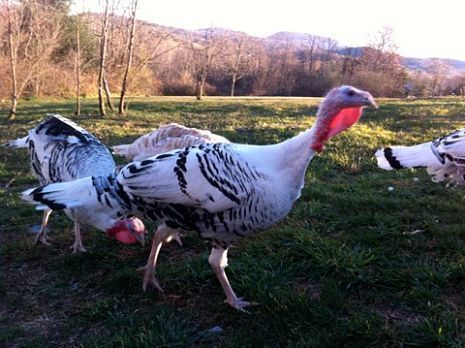
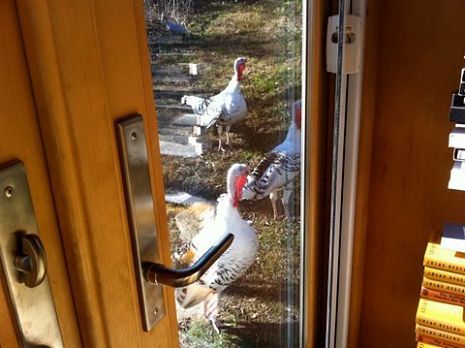
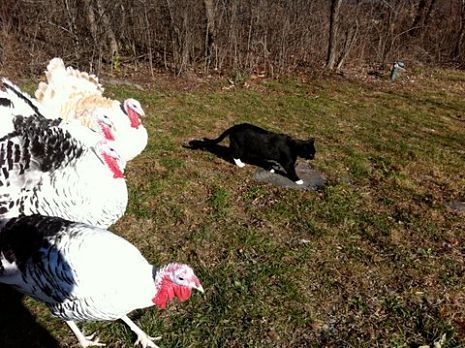
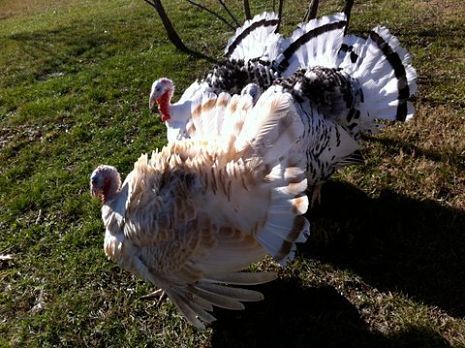
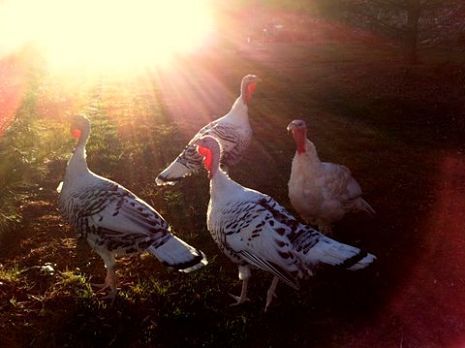
November 22, 2010
Seasonal
Every corny thing that's said about living with nature—being in harmony with the earth, feeling the cycle of the seasons—happens to be true. Noticing the approach of winter is inescapable here. The chickens stopped laying eggs a week ago; the garden has browned and crinkled up; the cattle, which had fuzzed up like teddy bears in the last few weeks, have been hauled away to their cold-weather quarters. Even my cats have gotten into the spirit of the season, stuffing themselves with as much cat food as I can absentmindedly give them. The other day I realized I hadn't seen their rib cages in weeks. A nation of mice has dispatched advance troops to my garden shed, and seem to have decided that the chicken feed stored there is the mouse provisions they ordered in the spring. Ladybugs have appeared out of nowhere in the space between my windows and screens. I don't know whether they want to come in or go out, but whichever it is, they are dying trying. The deer, usually happy to fill up on the grass and bushes far from the house, have begun to tiptoe closer, sampling, for appetizers, the hostas I planted this spring. Notices for firewood and snowplowing services are in the mailbox every day, or are tucked under my windshield wipers like seasonal love notes whenever I park my car. I was never any good at remembering dates, but now I hardly have to. When the first bulb catalogs get delivered and the hens start laying again, that's all the notice I'll need to know that winter has passed.
November 19, 2010
Subject: Stuff
It's not just the closing of e-mails that bedevils; it's just as hard to think of a proper way to begin one. "Dear So-and-So" sounds too formal, so Victorian, almost. What about "So-and-So" alone, followed by a dash or comma? I use that, but it does seem a little curt and commanding, like you're saying someone's name and then stamping your feet impatiently. So-and-So! I have tried "Hi So-and-So" and "Hey So-and-So" and find them both peculiar and too flip for addressing anyone other than a buddy, plus I don't understand how to punctuate. Do you follow "Hi So-and-So" with a comma? An exclamation point? Another dash?
Bottom line is that the conventions of letter-writing make an awkward fit with e-mail. There just isn't a good way to begin an e-mail or a good way to end one. And please don't get me started on the dread Subject Line. I don't feel as strongly as the person who posted on Twitter the other day, in all hysterical caps, "I HATE SUBJECT LINES SO MUCH I COULD KILL MYSELF," but I do wish they would just go away. They are either misleading or pointless, and annoying in the instance of those people who actually start their e-mails in the subject line—you know, those e-mails that begin "SUBJECT: I am SO pissed at Mabel that right now I am ready to" and then merrily continue with the rant in the body of the e-mail. But what else are you supposed to do? I can't even count the times I've put "Stuff" in a subject line, just because most of what I'm writing to people about is, in fact, stuff, and I am irritated every time I have to think of a pithy way to sum up what the rest of the e-mail says. If I could, I wouldn't have to write the e-mail, right? I could skywrite it, or text it, or send it by smoke signal—simple, efficient, direct.
November 17, 2010
Dear Reader
I don't know when I started signing off my e-mails with the expression "cheers." To the best of my recollection, I had never used the word in conversation, ever, except when accompanied by a clinking wine glass. I really have no idea how it came to be so rooted in my Internet vocabulary. Out of curiosity, I searched as far back as I could in my Gmail account, and there it was at the end of almost every e-mail, except for ones I had sent to my closest friends and family, which I signed off with the teen-age-y "xoxoxo" or sometimes, for variation, "xxxooo."
"Cheers" did solve a real problem. Other options for closing an electronic message seemed all wrong. "Sincerely" made any e-mail sound like one of those shady Nigerian money schemes, which ooze with "sincerely"s and "Dearest Madame"s and every other curlicue of faux propriety. "Yours" and "Yours truly" on an e-mail sound arch and antique. "Love," of course, would be a little startling on a brisk business e-mail. It's weird and exhausting even on a friendly one, because if you don't punctuate it (i.e., "Love, Susan") and instead use the breathless computer style of no caps and no commas (i.e., "love susan") it comes out sounding more like a plea for affection than a sign-off.
I've noticed lately that it seems most intimate to not use any closing on your e-mail at all, because it seems to make it feel like you are engaged in an ongoing conversation—as if this one e-mail doesn't represent the beginning and end of the interaction but is just part of a perpetual loop of friendly back-and-forth. Maybe this is also a collateral effect of text-messaging style, which begins with no salutation and ends with none (though I do have one friend who closes her texts with a formal signoff, which makes them seem as if she'd written them with a quill pen).
Cheers,
Susan
November 12, 2010
Afloat
Yesterday, it was reported that eighty-four-year-old actor Dick Van Dyke had fallen asleep on his surfboard in the middle of the Pacific Ocean, drifted so far out that he lost sight of land, woke up to discover his predicament, assumed he was going to die on the open water, but then was guided safely back to shore by a pod of porpoises. Talking to reporters later, the actor is quoted as saying, "I'm not kidding." This is one of those news stories so rich in kookiness that it is nearly impossible to put your finger on what part of it is the kookiest. Is it the fact that Dick Van Dyke surfs? The fact that any eighty-four-year-old surfs? Is it the simple and slightly surprising—and heartening—fact that Dick Van Dyke is still alive? Or just the notion that any sentient creature could fall asleep on a surfboard in open water?
The only part of the story that doesn't amaze is the fact that a pod of porpoises would see a floating, drowsy light-comic actor—who might have peaked with his portrayal of Rob Petrie but did excellent work in "Bye Bye Birdie" and "Mary Poppins" and even better work as the voice of Mr. Bloomsberry in "Curious George"—and guide him back to dry land. Then again, animals are so predictable that way.
November 11, 2010
Zumba
By the way, while you were sleeping, Zumba took over the world. This is not just my idle observation; according to Zumba.com, the fitness program's official Web site, in the mere three years since Zumba launched internationally, it has spread to 110 countries, offering classes in 90,000 locations. About 89,999 of the locations seem to be within walking distance of my house. In fact, in these dreary economic times, the one growth industry in upstate New York seems to be Zumba. There hardly seems to be a gym, a community center, a town hall, or an empty warehouse that doesn't offer a Zumba class a few days a week. What is it? Basically, even though the press material describes it as a "revolutionary new fitness concept" and "the single most influential movement in the industry of fitness," Zumba is really just an hour-long dance party to Latin music. Nothing wrong with that, of course—dancing for an hour is great aerobic exercise, plus it has the additional virtue of not seeming like exercise, which is what drives all great workout crazes (see, to wit, Jazzercise, Cardio Salsa, et al.).
I took my first Zumba class last week, in the community room of my town library. I wasn't sure if a workout class—even a "revolutionary new fitness concept"—would be much of a draw around here; the fact that the fried Oreo booth at the county fair ran out of product suggests a less than health-conscious populace. Also, it was a miserable, drizzly day, which made even me, something of a fitness enthusiast, feel more like eating a fried Oreo than working out. To my surprise, the library parking lot was overflowing, the class was fully subscribed, and a few stragglers were even turned away. You could have knocked me over with a feather. Most of my fellow Zumba-ers were clearly just embarking on the path to fitness, and many of us—especially me—were completely stumped by some of the fancy footwork. The genius of Zumba is that such things don't actually matter. We all had a blast, and the music, of course, was fantastic.
November 5, 2010
The Social Index
Human relationships used to be easy: you had friends, boy- or girlfriends, parents, children, and landlords. Now, thanks to social media, it's all gone sideways. I decided to try to index these new entities—to draft a sort of Social Media Bestiary. Here it is, so far:
MODERN RELATIONSHIPS
The friend you know well, have encountered frequently in the flesh, perhaps even hugged, have visited domestically, and would invite to your child's wedding, and with whom, coincidentally, you might occasionally communicate via social media in addition to more traditional friend channels such as lunch dates, telephone calls, et cetera (formerly known simply as "a friend")
The friend you sort of know, because you have friends in common and have maybe attended the same events—not together, but you've both ended up there because you know a lot of the same people. You perhaps would not have thought to invite this person to a small party, and yet you do include him in your wider sense of your social circle—and you now communicate with him via social media more than you ever did before such a thing existed, and you now have a surprising intimacy after years of static, unenergetic just-sort-of-knowing one another (formerly known as "an acquaintance")
The friend, or friend-like entity, whom you met initially via Facebook or Twitter or Goodreads or, heaven help us, Myspace. You met—online, that is—because… well, who remembers now, anyway? Maybe through some friend of a friend of a friend, or because some algorithm on Facebook "suggested" that you should be friends. In any case, you now interact with this person/stranger frequently—in fact, maybe many times a day—and, as a result, she enters your conversation the way anyone would with whom you exchange chitchat several times a day. When a real flesh-based friend asks you who this person is, you describe her as a friend, for lack of a better word. It's an awkward description because you have a) never met in real life b) might not actually know this person's full name or profession or background. Yet you look forward to interacting with this person, and if/when she mentions experiencing a sad event, a birthday, a job loss, a cute baby experience, or a car accident, you have a strong, actual reaction (this sort of friendship formerly had no name at all, since the only kind of liaison that even comes close to this in the history of human relations is that of pen pals)
The friend-like entity mentioned in No. 3—that is, someone whom you know only virtually—but in this instance you and this person have actually met. The meeting was probably brief and a one-off encounter, and it probably occurred because one of you happened to be passing through the other's hometown. When you finally meet, you spend most of your time chuckling over how much smaller/taller you look in your profile picture.



